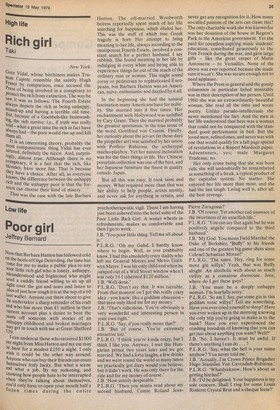High life
Rich girl
Taki
New York Gore Vidal, whose bitchiness makes Truman Capote resemble the saintly Hugh Fraser by comparison, once accused the Press of being involved in a conspiracy to protect the rich from extinction. The way he saw it was as follows: The Fourth Estate always depicts the rich as being unhappy, Mixed-up and having a terrible old time. f1,3nt, because of a Goebbels-like brainwashing, the rich survive: i.e., if truth was really told — what a great time the rich in fact have always had — the poor would rise up and kill them all.
It is an interesting theory, probably the most compassionate thing Vidal has ever uttered, definitely the nicest. And, surprisingly, almost true. Although there is no conspiracy, it is a fact that the rich, like blondes, have more fun. That is because they have a choice. After all, as everyone knows, the difference between the unhappy rich and the unhappy poor is that the formers can choose their kind of misery. That was the case with the late Barbara Hutton. The oft-married Woolworth heiress reportedly spent much of her life searching for happiness, which eluded her. This was the stuff of which true Greek tragedy is born Her attempt to bring meaning to her life, always according to the omnipotent Fourth Estate, involved a constant search for a perfect husband. I say rubbish. She found meaning in her life by indulging in every whim and being able to experience things far out of the reach of the ordinary man or woman. This might sound corny or pedestrian to sophisticated Europeans, but Barbara Hutton was an American, naive, enthusiastic and dazzled by it all.
In the beginning she had the natural fascination many Americans have for nobility. She married into it five times. Her enchantment with Hollywood was satisfied by Cary Grant. Then she married probably the greatest sportsman, in the true sense of the word, Gottfried von Cramm. Finally, her curiosity about the jet-set (in those days the propeller set) was satisfied by her union with Porfirio Rubirosa, the archetypal macho-playboy. Yet her natural inclination was for the finer things in life. Her Chinese porcelain collection was one of the best, and her Japanese furniture the finest in quality outside Japan.
But all this was easy. It took taste and money. What required more than that was her ability to help people, artists mostly, and never ask for anything in return, and never get any recognition for it. How many so-called patrons of the arts can claim this? The only charitable work she was known for was her donation of the house in Regent's Park to the American government. Yet she paid for countless aspiring music students' education, contributed generously to the Free French during the war, and gave large gifts — like the great carpet of Marie Antoinette — to Versailles. None of the above was ever reported because she made sure it wasn't. She was secure enough not to need applause.
Where the Press in general and the gossip columnists in particular failed miserably was in their description of her person. Until 1960 she was an extraordinarily beautiful woman. She read all the time and wrote poetry. Unlike pseudo-intellectuals she never mentioned the fact. And the men in her life understood that here was a woman that could not be conquered with the standard good performance in bed. But she loved men, refined ones, and never was with one that would qualify for a full page spread of revelations in a Rupert Murdoch paper. Adventurers, yes; male Margaret Trudeaus, no.
Her only crime being that she was born rich, she will undoubtedly be remembered as something of a freak, a typical product of the capitalist system. No matter. She enjoyed her life more than most, and she had the last laugh. Living well is, after all, the best revenge.











 Previous page
Previous page